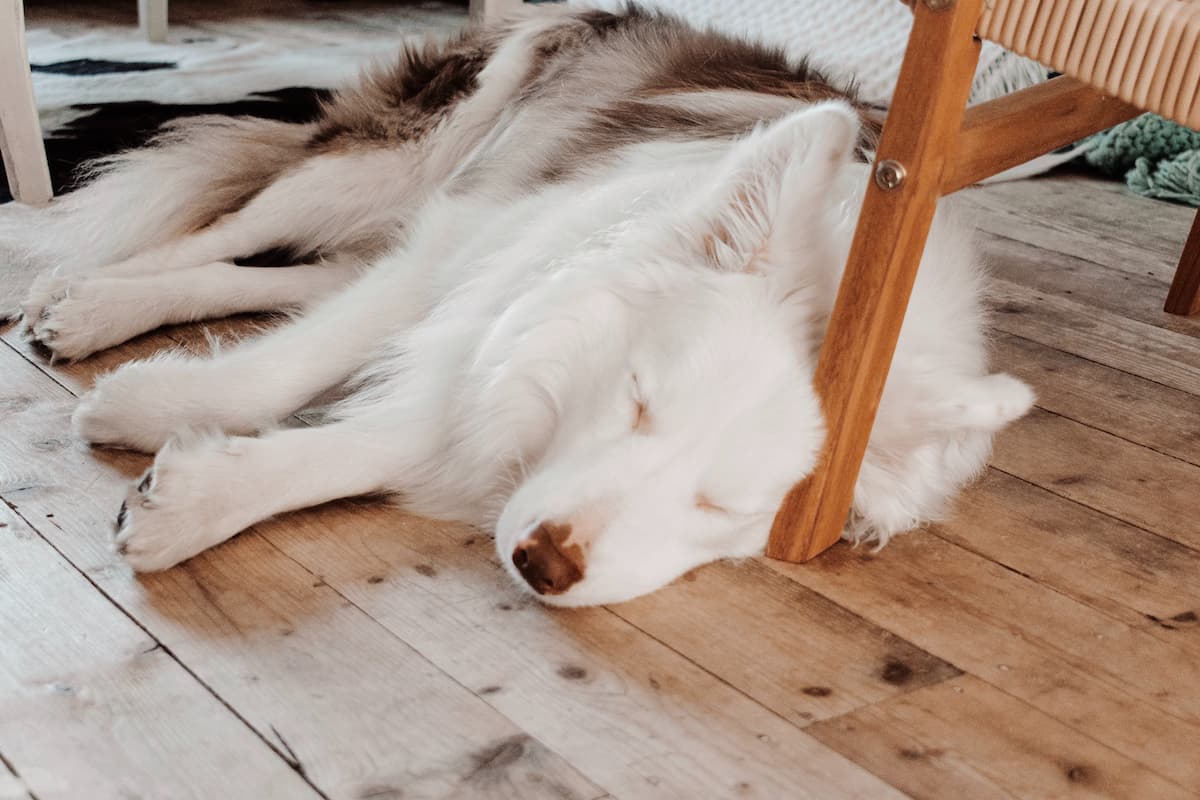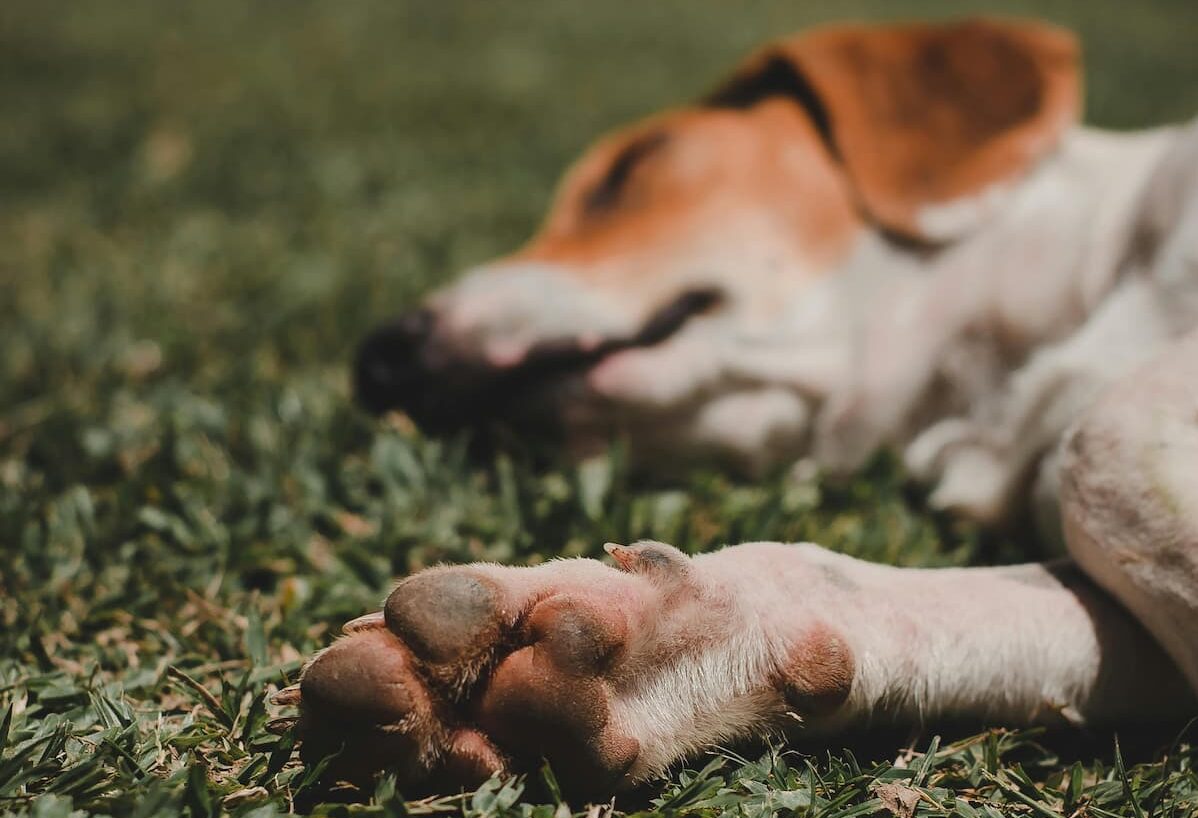Have you ever found yourself snuggled up next to your beloved furry friend, only to be abruptly awakened by the unmistakable sound of their snoring?
If so, you’re not alone!
It seems that as dogs age, snores become a regular symphony in their sleep repertoire.
But why do dogs snore more as they get older?
Read on to find the answer.
Exploring the Possible Causes of Snoring in Senior Dogs
As our furry friends age, they may develop certain quirks and habits that come as a surprise to us.
One of these common changes is snoring.
You might have noticed that your once silent sleeper has started producing a symphony of snores during nap time.
But why do dogs snore as they get older?
Here are some scientific reasons:
1. Weight gain: Just like in humans, weight gain can contribute to snoring in dogs.
As they age, dogs tend to become less active, leading to a potential increase in weight.
Extra pounds can put pressure on their respiratory system, narrowing the air passages and causing snoring.
Additionally, excess weight can contribute to respiratory problems, making it even harder for your furry companion to breathe freely during sleep.
2. Infections and allergies: As dogs age, their immune system may not work as efficiently as it used to.
This can make them more susceptible to respiratory infections and allergies, which can lead to snoring.
Infections can cause inflammation in the nasal passages and throat, while allergies can trigger excessive mucus production or swelling.
3. Changes in muscle tone: With age, dogs, just like humans, experience a decrease in muscle tone and elasticity.
This loss of muscle tone can affect the tissues in their throat and lead to a more relaxed airway, resulting in snoring.
Lifestyle Adjustments to Help Reduce Snoring in Aging Dogs
While changes in muscle tone a natural part of the aging process, there are some exercises and activities that can help maintain muscle tone in senior dogs.
For instance, chew toys or dental chews can help strengthen the muscles in the mouth and jaw, reducing the chances of snoring.
Ensuring your older dog maintains a healthy weight through a well-balanced diet and regular exercise can also help reduce snoring and improve their overall health.
Certain lifestyle adjustments can also make a difference in reducing snoring in aging dogs.
Elevating their sleeping position, whether through using a dog bed or adding an extra pillow under their head, can help open up their airways and decrease snoring.
Providing a comfortable and quiet sleeping environment free from disturbances can also promote better sleep quality and minimize snoring.
Additionally, using a humidifier in their sleeping area can add moisture to the air, preventing dryness in their nasal passages and reducing the likelihood of snoring.
Finally, treating any underlying infections or managing allergies with the help of your veterinarian can help alleviate snoring in senior dogs.
Overall, snoring in aging dogs is a natural occurrence due to changes in their bodies.
By understanding the causes of snoring and implementing simple lifestyle adjustments, you can help reduce the frequency and intensity of your beloved canine companion’s snoring, improving their sleep and overall well-being.
Remember, if you have any concerns about your dog’s snoring or breathing patterns, it’s always best to consult with your veterinarian for personalized advice and guidance.
FAQ
Q: Is snoring a normal occurrence in older dogs?
A: Yes, it can be quite common for dogs to snore as they age.
Just as humans may develop certain tendencies as they get older, dogs experience changes in their bodies too.
As their muscles relax with age, the tissues in their airways can become looser, leading to vibrations and the oh-so-familiar snoring sound.
Q: Are certain dog breeds more prone to snoring?
A: Absolutely!
Some dog breeds are naturally more predisposed to snoring than others due to their anatomy.
Breeds with short snouts and flat faces, like Pugs, Bulldogs, and Shih Tzus, have narrower air passages, which may cause increased snoring.
That being said, snoring can affect any dog, regardless of their breed.
Q: Can I do anything to help reduce my dog’s snoring?
A: Definitely!
Though you might not be able to eliminate snoring completely, there are a few steps you can take to potentially reduce its intensity.
First and foremost, ensure that your furry friend maintains a healthy weight.
Excess weight can put extra pressure on their airways, leading to increased snoring.
Regular exercise and a balanced diet can go a long way in preventing weight gain.
Q: Is there a specific sleeping position that can alleviate snoring?
A: Yes, choosing the right sleeping position can make a difference!
Encouraging your dog to sleep on their side instead of their back can help keep their airways more open, reducing snoring.
You can even provide them with a cozy bed or pillow that allows for comfortable side-sleeping.
Q: Are there any potential health concerns associated with snoring in older dogs?
A: Snoring is often harmless and part and parcel of the aging process for dogs.
However, in some cases, it could indicate an underlying health issue worth investigating.
If you notice a sudden and significant increase in your dog’s snoring, frequent pauses in their breathing, or excessive daytime sleepiness, it could be wise to consult your veterinarian who can assess if further examination is required.
Q: Can allergies or respiratory problems cause snoring in older dogs?
A: Absolutely!
Just like us humans, dogs can also suffer from allergies or respiratory problems that lead to snoring.
Allergies can cause nasal congestion and inflammation, while respiratory conditions like asthma or bronchitis may affect airway passages, leading to heightened snoring.
If you suspect these issues may be the culprit, consult your vet for proper diagnosis and treatment options.
Q: Can I use over-the-counter remedies to help with my dog’s snoring?
A: It’s generally not recommended to use over-the-counter remedies without veterinary guidance.
Some products marketed for reducing snoring in dogs may contain ingredients that could be harmful to your furry friend.
Always consult your veterinarian before administering any medications or remedies to ensure their safety.
Q: Is there anything else I should be aware of as my dog ages and continues to snore?
A: While snoring in older dogs is often harmless, it’s essential to monitor any changes or new symptoms closely.
Regular veterinary check-ups are crucial to catch and address any potential health issues early on.
Remember, aging is a natural process, and our furry companions might need a little extra care and attention.
Embrace the snoring symphony as a reminder of the beautiful journey you and your dog have shared together!
Bringing it All Together
Just like their human counterparts, dogs can’t escape the natural effects of aging.
As their muscles lose their youthful tone and their bodies start to sag (yes, even our beloved pups are not immune to gravity’s whims), the anatomy of their respiratory system can also undergo changes.
This can result in a narrowing of the airway, leading to the glorious, albeit occasionally loud, melody we know as snoring.
But don’t let their sinus symphonies fool you!
Snoring in older dogs is typically harmless, often just an amusing quirk of their aging bodies.
However, it’s always good to keep an ear out for any sudden changes in breathing patterns or excessive snoring, as these could be signs of underlying health issues.
If you have any concerns, it’s best to consult with your trusty veterinarian, who can provide guidance tailored to your four-legged friend’s needs.
So, next time you find yourself being lulled to sleep by the gentle hum of your senior dog’s snoring, remember it’s simply a testament to their years of loyalty, companionship, and, yes, perhaps one too many treats.
Embrace the soundtrack of their well-deserved rest and cherish every moment spent with our aging buddies.
After all, a snore is a small inconvenience for the undying love and joy they bring into our lives.












